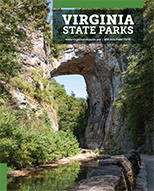Read Our Blogs
Song of Spring
Shared by Tanya Hall, as Guest Blogger.
Do you hear it? Can you hear the song of spring that rises as the sun goes down? Is it a Spring Peeper? A Wood Frog? A Copes Gray Tree Frog?
Spring evenings are filled with the sounds of happy little frogs doing what birds and bees do -- but there’s something a little mysterious about these creatures that hide in the grass at water’s edge and sing after dark. Even when we’re close to a frog, we often don’t see them so much as witness evidence of a splashing retreat. They are masters of staying hidden, and professionals at being heard.

On March 22, 2020, Dr. Kevin Hamed will give a presentation at Hungry Mother State Park about amphibians of Hungry Mother. Dr. Hamed is a herpetologist in the Fish and Wildlife Conservation department at Virginia Tech. The event begins at 3 p.m. at the Discovery Center, and a short hike will follow for those who would like to see a few amphibians in their actual habitat.
In addition to frogs, he’ll also talk about salamanders. Talk about an animal that excels at staying hidden! And yet, if you know where and how to look, you’ll find that our region is teeming with salamanders: just one of the reasons why Southwest Virginia is one of the most biodiverse regions of North America.

Amphibians literally refer to animals that spend part of their lives in water and part of their lives on land. Amphibious creatures include frogs, toads, newts, and salamanders. You’ll be amazed to learn just how many varieties of species exist in Southwest Virginia -- and you might be surprised to find out how prevalent they are all around us. They’re discreet, but that doesn’t mean we don’t need to be careful of our impact on them.

Dr. Hamed will help us identify those loud chirps, peeps, croaks, and burps. He’ll explain the fascinating life cycles that bring these animals into an important aspect of our ecosystem. Why, in the end, you might find yourself so enamored with amphibians that you will absolutely want to kiss a toad -- in hopes that it never turns into a prince, but only lives a royal life in the ponds and creeks it calls home.
If you have read the article and have a question, please email nancy.heltman@dcr.virginia.gov.
Search for blogs
By Park
Categories
Cabins
Camping
Fishing
History and Culture
Other
Programs and Events
Trails
Volunteers
Water Fun
Archive
2026
2025
2024
2023
2022
2021
2020
2019
2018
2017
2016
2015
2014
2012













